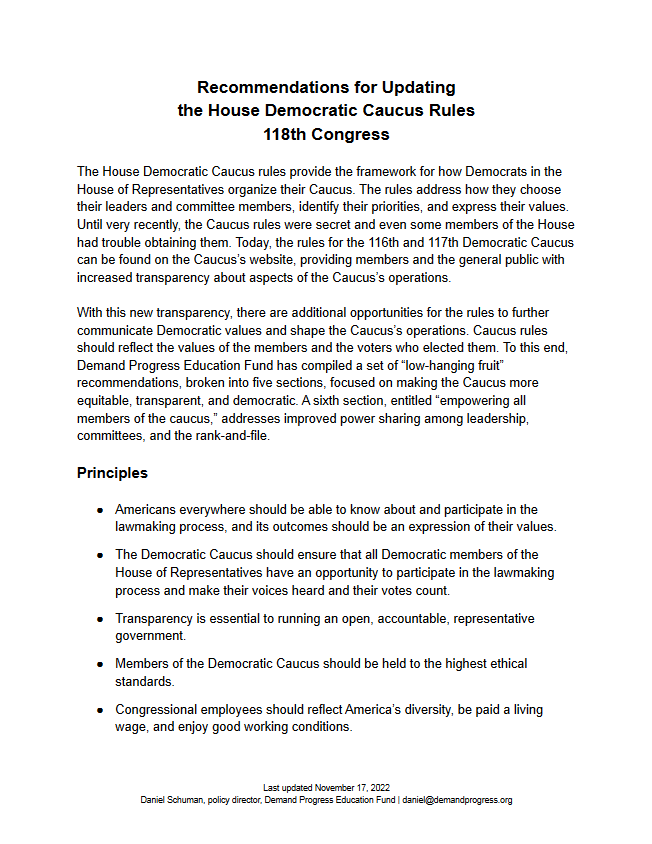TOP LINE
Congress had some of its most substantive conversations about its rules in years last week. Although the results mostly fiddled around the edges of larger institutional problems, time and opportunity remain to continue the negotiations, at least in the House. The stasis within the Democratic caucus, however, was notable.
Meanwhile, things that need to be done — and done well — remain with little time to accomplish. Democrats continue to play small ball about the risk posed by the debt ceiling, while several House committees have weeks to sift through evidence of various Trump-related malfeasance.
This week, the lame duck session continues, with votes scheduled Tuesday onward in the House. Looking at the Weekly Leader, we see the NDAA, Respect for Marriage Act, a bunch of minor bills, and the reminder that “additional legislative items are possible.” Per Politico’s Olivia Beavers, Monday through Wednesday this week the House Republican Steering Committee will fill in committee chairs. We hear the House Democratic Caucus may continue to consider conference rules on Tuesday, including some that get at the distribution of power. The Georgia senatorial run-off is Dec 6, after which Republicans may become publicly serious about addressing the approps omnibus. The Senate floor schedule is unrevealing. Go here for the committee schedule.
TALKING ABOUT CHANGE
The process for establishing the rules of the House of Representatives is different this time. House Freedom Caucus members succeeded in forcing a conversation within the Republican conference, which continued last week in another round of closed-door meetings on member-proposed amendments to existing rules.
Freedom Caucus members did not secure their biggest objective, which was more member control of the Steering Committee through additional elected seats (although the House GOP does have new regional maps). They also failed to prevent the continued existence of earmarks, which most members see as a useful tool even if most of the gravy falls on appropriators. (There is a better way….) But HFC forced a serious and significant discussion within the conference about member power and leadership control. Such a discussion is healthy for the institution. It’s also one that will continue over the upcoming weeks and perhaps during the first meeting of the committee of the whole of the 118th Congress.
Democrats in both chambers, meanwhile, so far have chosen to freeze the status quo in place. After ratifying the generational shift in leadership, members of the House caucus are in the process of granting the Second Triumvirate the same ironclad control the last generation enjoyed. Accordingly, today’s rank-and-file and their successors may not get another chance to exercise power until another generation has passed. The pending transition will be about continuity rather than change and is a missed opportunity for a reform conversation like the one happening across the aisle. Of most significance, after a concerted leadership push, the caucus tabled Rep. Ed Case’s amendment to rebalance some of the power within the caucus through creating a more representative Steering and Policy Committee that has more member input. That measure could be brought up again on Tuesday, and other significant amendments have yet to be considered. (The concern here is not with the members of the Second Triumvirate, but with how broadly power is distributed.)
Senators, meanwhile, rejected Sen. Sheldon Whitehouse’s renewed effort to disallow top leadership from also holding A-level committee gavels. Although Whitehouse’s efforts might have been personally motivated, the principle of giving a few more Democratic senators an opportunity to lead is well taken. There is late word that the Senate Democratic Caucus will now begin to publish its caucus rules online, joining the other three party caucuses.
By the way, the fact that we only could learn about the outcomes of these party meetings through an amalgamation of reporters’ tweets and stories is frustrating. The parties should publish the proposed amendments, as well as the vote outcomes, because they are critical to understanding how the chambers will operate.
Also, to make your lives easier (and ours), we’re keeping track of proposed House Democratic and Republican amendments to their caucus rules, including the disposition of those amendments. This is hard to do because the information is all non-public, which is why we’ve been closely following the tweets and reporting of a handful of congressional reporters who have ferreted out some of the text and vote results. If we missed something or got something wrong, please let us know.
Continue reading “First Branch Forecast for December 5, 2022: The Second Triumvirate” →



